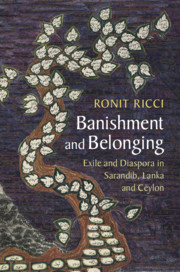Book contents
- Banishment and Belonging
- Asian Connections
- Banishment and Belonging
- Copyright page
- Contents
- Figures
- Maps
- A Note on Orthography and Manuscripts
- Acknowledgments
- Abbreviations
- Maps
- 1 Introduction
- 2 Diasporic Crossings: Malay Writing in Nineteenth-Century Ceylon
- 3 Remembering Java
- 4 “Ceyloned”: The View from the Other Shore
- 5 Exilic Journeys in Time, Place and Writing
- 6 Nabi Adam: The Paradigmatic Exile
- 7 Banishment and Interreligious Encounters: A Malay Ramayana
- 8 Ceylon Malays: Military and Literary Paths
- 9 Malay Writing in Ceylon: Roots and Routes
- Glossary
- Bibliography
- Index
6 - Nabi Adam: The Paradigmatic Exile
Published online by Cambridge University Press: 11 November 2019
- Banishment and Belonging
- Asian Connections
- Banishment and Belonging
- Copyright page
- Contents
- Figures
- Maps
- A Note on Orthography and Manuscripts
- Acknowledgments
- Abbreviations
- Maps
- 1 Introduction
- 2 Diasporic Crossings: Malay Writing in Nineteenth-Century Ceylon
- 3 Remembering Java
- 4 “Ceyloned”: The View from the Other Shore
- 5 Exilic Journeys in Time, Place and Writing
- 6 Nabi Adam: The Paradigmatic Exile
- 7 Banishment and Interreligious Encounters: A Malay Ramayana
- 8 Ceylon Malays: Military and Literary Paths
- 9 Malay Writing in Ceylon: Roots and Routes
- Glossary
- Bibliography
- Index
Summary
This chapter takes a foundational Muslim tradition known from early Arab sources and widespread in Muslim Southeast Asia, namely Adam’s banishment from paradise and his landing in Sarandib (the Arabic name for Sri Lanka), as a starting point to ask whether Adam’s fall to earth in this particular site mattered to, or shaped in some way, Malay perceptions of exile to colonial Ceylon, and if so, how? Based on references to Adam and his plight found in Malay sources from Sri Lanka, Arabic sources, among them Ibn Battuta’s Travels, and the Javanese Serat Menak Serandhil (a volume of Menak tales narrating the life of the Prophet’s uncle Menak Amir Hamza, which unfolds in Sarandib), the chapter argues that the ancient story of Adam’s banishment from paradise to earth, a paradigm for all future banishments, was deployed to frame and partially give meaning to exile to Ceylon. Recalling Adam’s fall shifted the temporal frame of political exile under colonial domination and located contemporary, worldly events within a divinely determined chronology.
- Type
- Chapter
- Information
- Banishment and BelongingExile and Diaspora in Sarandib, Lanka and Ceylon, pp. 125 - 148Publisher: Cambridge University PressPrint publication year: 2019



